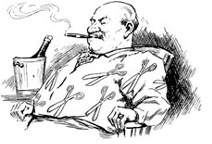
The Gospel of Adjustment, Common Ground & Mediocrity
THE FIRST MODERN MAN: NOT MARX, BUT MONTAIGNE
In a pamphlet entitled “The Orthodox Poetic,” Arvid Schulenberger distinguished four important worldviews: the classical Greek, the Old Testament, the Christian, and the modern.
Greek: Man is a rational animal living under natural law seeking happiness through knowledge.
Old Testament: Man is a free individual living under divine law seeking righteousness through obedience.
Christian: Man is a fallen being living under divine grace seeking salvation through love.
Modern: Man is a sensitive creature living under social law seeking security through adjustment.
Compare modern man with any of his three predecessors, and we see a loss of dignity, nobility, and heroism. The Greeks, Hebrews, and Christians aspired to such sublime goals as knowledge or righteousness or salvation. But the meager aim of modern man is security, a paltry good by comparison. Where the Greeks, Hebrews, and Christians acknowledged a transcendent divine law that determined the universal meaning of good and evil, modern man asserts that moral laws are cultural and historical constructs and that truth is relative — that is, unknowable. Where the classical and Judeo-Christian traditions cultivate perfection of the mind, will, or heart, and affirm goals that require discipline, determination, or sacrifice, the basic thing modern man demands of himself is adjustment or adaptability.
You May Also Enjoy
Willa Cather understands there’s a bleak side to the Romantic ideal of the American dream, a critical misinterpretation that the dream focuses on you rather than on others.
James Fenimore Cooper's 'The Last of the Mohicans' is the birthright of every American; it helps to explain who we are to ourselves.
"No man will be found in whose mind airy notions do not sometimes tyrannize and force him to hope or fear beyond the limits of sober probability."

